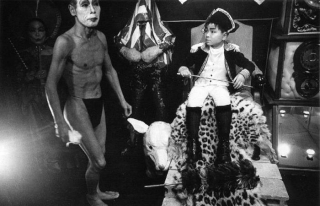Tale of a Visionary: Shuji Terayama
Date: 15 October 2000 | Season: Leeds Film Festival 2000
TALE OF A VISIONARY: SHORT FILMS BY SHUJI TERAYAMA
Sunday 15 October 2000, at 6pm
Leeds City Art Gallery
Shuji Terayama is a legendary and unique figure in the cultural history of Japan. From the age of 19, he was a celebrated haiku and tanka poet and went on to become an award winning radio dramatist, a distinguished photographer, a respected boxing correspondent and one of the country’s most successful horse racing tipsters. In 1967, keen to break away from words and letters, he formed the forward thinking Tenjosajiki experimental theatre group, in order to “write poems with bodies”, and soon became renowned for his original and controversial performances. The troupe often comprised of midgets, freaks, runaways, vagrants and obese misfits, and the plays challenged the most progressive notions of contemporary theatre. The works were rarely performed in conventional auditoriums, and were more likely to be staged in the streets of Tokyo, or by leading audiences into private houses. The plays were non-narrative, disjointed and often vulgar, regularly descending into violence or fantastic orgies of naked flesh.
Not content with scandalising the theatre world, Terayama moved into filmmaking and his debut Nego-Gaku (Catology, 1962) set the pace for future productions, being a political fable about a cat being tortured by children and a dwarf. The central themes of Terayama’s films, as with much of his theatre work, are the need to overthrow and discredit authority, the tyranny of the family, the torment of adolescence and memories of sexual experiences. In 1964, his book “Abandon Your Homes!” openly encouraged teenagers to runaway and revolt again their parents and the conventions of Japanese tradition and society, a proposition explored in his first feature film, the unpredictable collage Sho O Suteyo Machi E Deyo (Throw Away Your Books, Let’s Go Into The Streets, 1971). He was a prolific maker of short films, which depict an even more personal and idiosyncratic vision than his five bizarre features, and the six films in this brief retrospective illustrate various aspects of Terayama’s radical style.
His most notorious film is Tomaten-Ketchup Kotei (Emperor Tomato Ketchup, 1972) in which pre-pubescent children lead a revolution against consumerism and bring about a new totalitarian state where grown-ups may be tied up, beaten and raped. This exploration of the taboo is told in a hallucinatory style, reminiscent of Jack Smith’s controversial experimental film Flaming Creatures (1962).
Shuji Terayama died in 1983 at the age of 47, having suffered from nephritis since his teenage years.
Shuji Terayama, Chofuku-Ki (16+-1), 1974, 15 min
Shuji Terayama, Tomato-Ketchup Kotei (Emperor Tomato Ketchup), 1970, 26 min
Shuji Terayama, Keshigomu (The Eraser), 1977, 20 min
Shuji Terayama, Hoso-Tan (Tale of The Smallpox), 1975, 31 min
Shuji Terayama, Issunboshi O Kijutsusuru Kokoromi (An Attempt To Describe The Measure Of A Man), 1977, 15 min
Shuji Terayama, Kage No Eiga: Nito Onna (Shadow Film: A Woman With Two Heads), 1977, 20 min
This programme subsequently screened as two separate programmes at London ICA Cinema and Brighton Cinematheque.
